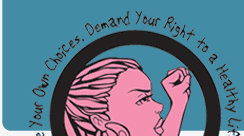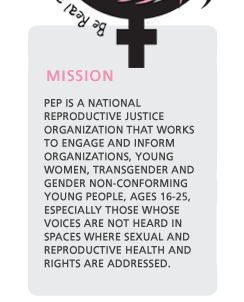Can you be Pro-Choice even if you don�t really understand what �Choice� means? If the answer is yes, then I�ve been Pro-Choice all of my life. And yet, I remember the day that revealed what Choice really means to me.
I was seventeen years old and on vacation from my fancy boarding school, where I was a scholarship student. As usual, my friends and I were meeting up at our old junior high school to spend the day together. I was just back from visiting colleges that summer, and I had my heart set on going to an Ivy League school. My father dropped out of the ninth grade. Pop, my maternal grandfather, left school in third grade to support himself running errands and doing odd jobs. Going to college, particularly an elite school was a big deal to my whole family, and my chances for going to one of those schools were looking good.
As I waited on the platform for the #1 train, I realized I hadn�t brought an umbrella. The day was dreary, but I was too excited to see my friends to care. By the time the subway arrived a drizzling rain had started. I hopped onto the train before the doors closed and slid into an empty seat.
Next to me sat another young Latina, and like me she was into bright lipstick and hoop earrings. We both had long curly hair, which she wore loose down her back. I was much less confident and wore my mass of hair in a ponytail high on my head. I noticed she seemed deep in thought when I saw it � a neon green pamphlet. In big bold letters on the front it read �After your abortion, then what?� My mind exploded with a million different feelings. What was she doing with that pamphlet?
This Hermana was my age, from my neighborhood; our families were probably from the same island. For all I knew we could have been related. Why her and not me? I could have just as easily been sitting in her seat holding that green pamphlet. Instead, I was dreaming of making the honor roll and going to Yale, and she was considering her �then what?�
A few months later, I was back at school working on my college applications and dreading the personal essay I had to write. Then I remembered that day on the train. I went back to my dorm and searched my journal for the entry I had written about the Hermana with the neon green pamphlet. She changed my life that day. She was doing the best she could to make her life better, to make the right decisions for herself. I wanted to reach out to her and hug her, let her know that she wasn�t alone, but I couldn�t. I didn�t dare intrude on her life, so I did the only thing I could think of - I pulled my journal out of my bag and started to write. I didn�t want to lose a single detail of that train ride or the young Latina, who could have been me.
Later that year, I earned a place in Yale�s freshmen class, I think in large part, because of her. I never knew her name or the outcome of her �then what?� I hoped that her life�s path had lead her to amazing places, and I was grateful an abortion would allow her a different �then what?� than might have otherwise been possible.
Since that train ride, I�ve thought a great deal about Choice and how different it is for different people. And since that train ride, I�ve remained steadfast and loyal to the ideals embodied in Choice. I�ve argued with family and friends about abortion rights, voted for Pro-Choice candidates, and become director of a national reproductive rights organization. But Choice means something different to me now.
Choice is actually phony. Although Roe is on the books, whether a woman has access to an abortion depends on many factors, such as where she lives, what resources she has, whether she is a woman of color or a young woman. Choice doesn�t address privilege. Choice doesn�t acknowledge class differences or racism. In other words, Choice doesn�t understand me. It doesn�t see all of me. It embraces just a small part of who I am or might be, making the other parts of me invisible. Choice speaks only to a small part of the way I live in this world, and I must have more than that. I deserve more than that.
My young Latina sister on the train had access to an abortion, but she could just as easily not have had services accessible. She deserves better than that. Yes, I owe tremendous debt to all those who fought for Choice, but I�ve realized that my relationship with Choice just isn�t enough for me anymore, and it shouldn�t be enough for all of us either. | 





